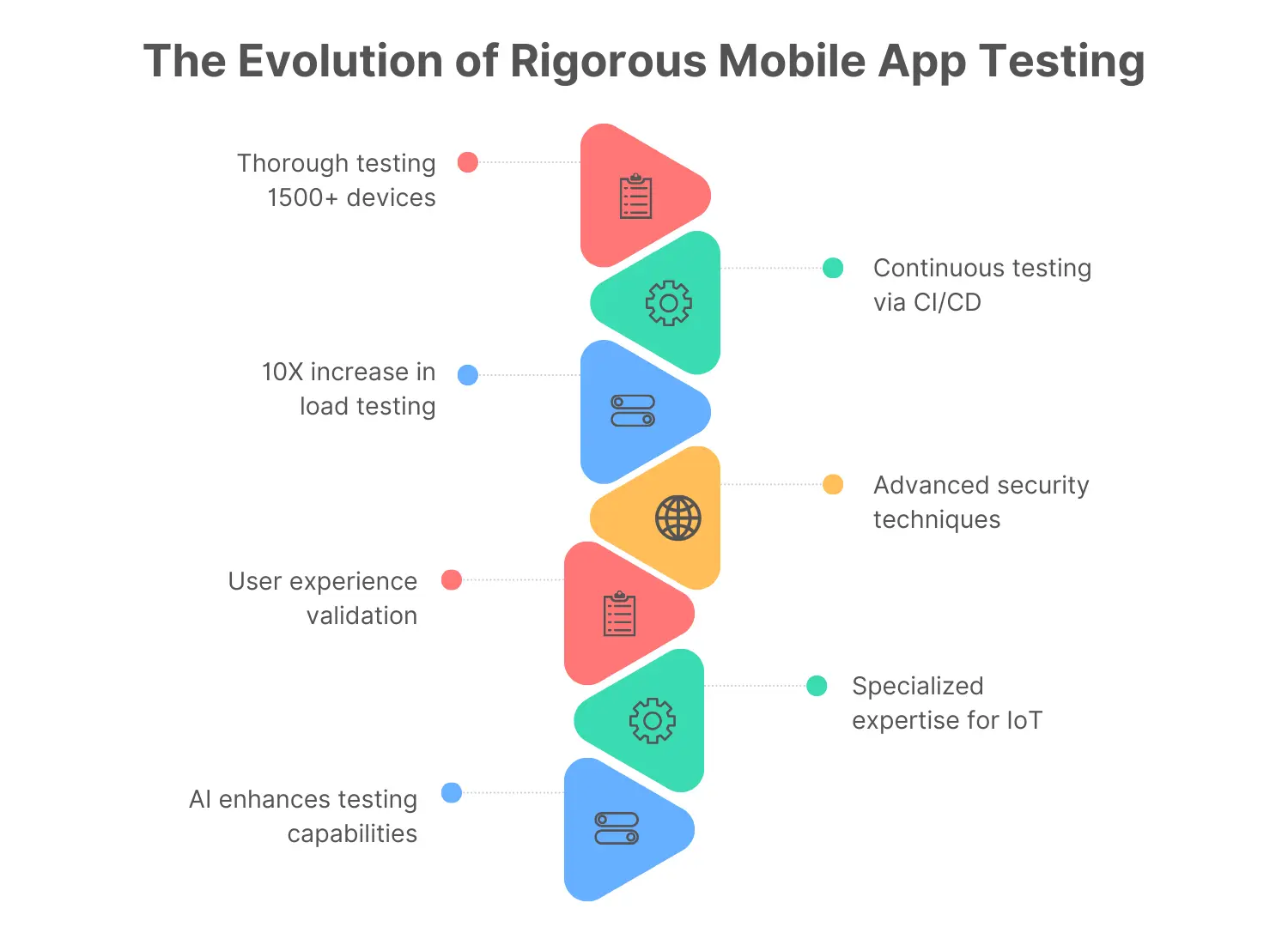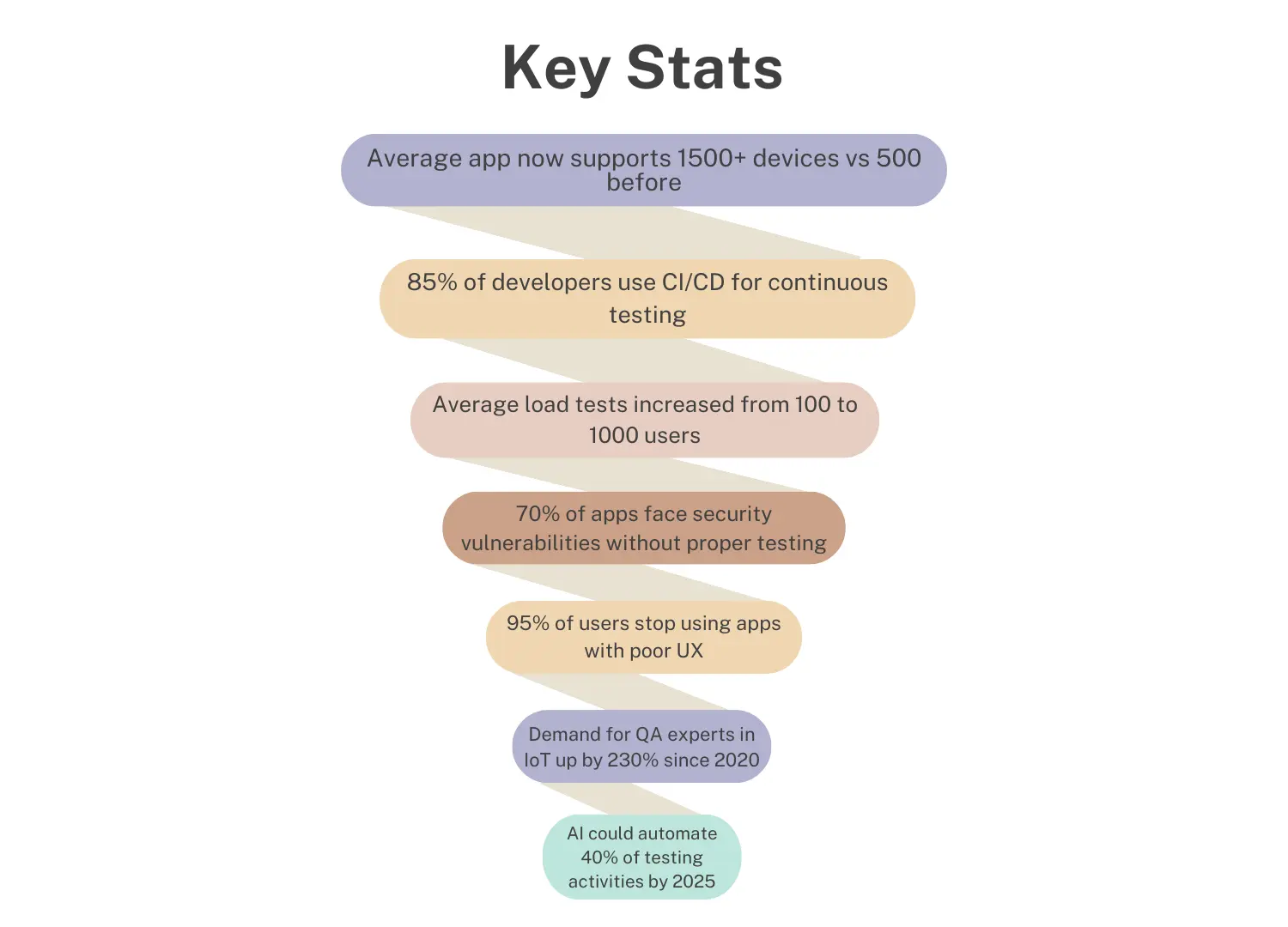With the proliferation of mobile devices, ensuring high-quality user experiences through rigorous QA has become non-negotiable for app success. This extensive guide covers why QA and software testing services are crucial along with best practices, challenges and consequences of poor app quality.
What Is Rigorous Testing?
Rigorous QA testing is critical for mobile apps developed by top companies in USA. Some key aspects include:

- Thorough testing across 1500+ devices is the new norm considering device fragmentation. Previously only top 500 devices were tested.
- Continuous Android and iOS mobile app testing integrated with development through CI/CD is now standard practice compared to isolated testing phases of the past.
- Load & performance testing capacities have increased 10X over the last 2 years to validate scaled-up throughputs and concurrencies with growing user bases.
- Security auditing & privacy validation remains crucial with evolving regulations. Advanced techniques like static analysis, dynamic testing, fuzzing and bug bounty programs are increasingly leveraged.
- User experience validation shifts focus from functionalities to qualities like intuitive workflows, personalized assists and immersions through AR/VR adopting human-centered design approaches.
- Mobile app software testing of emerging technologies like IoT, wearables, augmented reality requires specialized expertise that is driving demand for experienced QA professionals particularly for enterprise apps.
In the future, AI/ML could enhance testing through capabilities like test case generation from natural language, automatic pixel-level comparison of screens and predictive analytics of vulnerabilities. Edge devices and adaptive UIs too would require more nuanced validations. Overall, rigorous quality processes ensure user delight! All you need is the support of the best app development agencies in USA.
Benefits of Rigorous Testing
The need for QA experts is going to go up by 22% from 2020 to 2030. The rapid growth of devices and emerging technologies has greatly expanded the scope of rigorous testing. Continuous integration, security best practices, extensive compatibility testing and validation of immersive experiences are now essential to deliver high quality apps across a highly fragmented mobile ecosystem. AI promises to further augment testing capabilities ensuring best user outcomes.
Detects and Eliminates Defects, and Bugs
Rigorous QA allows pinpointing issues affecting functionality, performance or design before release. Manual testing identifies defects across various environments and edge scenarios not covered by automation alone. Flawless execution depends on eliminating bugs from user interfaces, workflows, network integrations and backend systems. Regular regressions further enhance stability through a release cycle. This forms the foundation for a robust app validated by QA consulting services.
Ensures Compatibility with Multiple Devices and Platforms
As apps require supporting varied devices, OS versions, languages and hardware specs, thorough QA testing verifies consistent behavior across this fragmented landscape. Cross-platform Outsource App Development without QA may lead to discrepancies. Compatibility testing performed meticulously by QA companies ensures buttery-smooth operations regardless of environment supporting diverse user needs.
Improves User Experience (UX)
QA focuses beyond mere functionality to optimize intuitive app flows, ergonomic inputs and cognitive ease of use. Usability testing extracts user pain-points for refining interaction designs by a top mobile app development company. Accessibility and localization testing under varied conditions identify areas enhancing inclusivity for broader appeal. Rich insights make the application engaging while fulfilling purposes simply through a positive UX, the foundation of success.
Maintains Data Privacy and Security
As apps handle sensitive user information, thorough security QA scanning finds vulnerabilities proactively. Penetration testing probes for data leaks, while privacy audits verify compliance with regulations for users’ trust. Risk assessments evaluate threats to mitigate future lawsuits. Updating procedures consider new best practices, keeping customer data protected for reliability under customized QA services.
Increases Customer Satisfaction and Loyalty
Satisfied users translate to ratings, references and organic promotions. QA ensures smooth experiences retaining users instead of frustrations driving uninstalls. Feedback analyses reveal issues for priority fixes and future enhancements delighting users. Methodical testing procedures followed through by dedicated QA software testing companies help deliver what users love through each version. Positive reviews boost discovery and trustworthiness for sustained growth.

Best Practices for Effective QA in Mobile App Development
Automated Testing
Automation is critical for large-scale testing by top mobile app development companies in USA. Unit tests validate code logic and modules independently. Integration tests verify interfaces and configurations. UI automation scripts using Appium or Selenium test visual elements, flows and backend interactions across multiple devices in parallel continuously with each code change. Well-structured automation ensures high test coverage catching bugs early. Mobile apps built on test-driven practices embed testability. Page Object Models organize tests. Utility classes contain commonly used functions. Data-driven testing hits various scenarios through TestNG/JUnit top app development frameworks. Rigorous testing requires comprehensive automation through quality test scripts, intelligent framework design and multi-device grid setup. Test data preparation and result validation need attention. Test case management in JIRA/QTest links tests to requirements for impact analysis. Jenkins/Bamboo run automations and generate reports on pull requests easing code reviews by cross-functional teams. This maximizes bug findings through quick automated regression runs.
Cross-Functional Teams
Early involvement of developers, QA, product and management stakeholders facilitates designing testability considerations into architecture. Frequent collaboration clarifies scope and prioritization from a unified big picture. Task tracking boards provide visibility into respective works for coordination. Planning poker sessions help estimate testing efforts. Pair programming helps developers understand testability. Defect resolutions involve joint debugging to reach root-causes faster. Retrospectives action areas for process improvements. Cohesive cross-team work supported by open communication, willingness to learn and timely feedback reduces reworks for rigorous mobile app QA at an increased velocity.
Continuous Integration and Continuous Deployment (CI/CD)
Automation configured on CI pipelines like Jenkins, builds and tests code upon commits, flagging regressions. Tests executed on real and virtual devices using integrated mobile labs scale testing. Customizable pipelines trigger automated deployments to beta tracks of testers. Issue tracking integrated into the pipelines. Changes detected by Bitbucket/GitHub webhooks trigger re-validations. Early and frequent feedback improves quality. Artifact repositories store past builds. Well-structured pipelines overseen by mobile application consulting services speed up testing cycles and catch deviations early through continuous testing.
User Acceptance Testing
Real users from target demographics test pre-released builds mimicking production to finalize validation. Moderated and unmoderated tests gather qualitative insights. Test cases designed around user goals complement developer/QAled verifications. Usability labs evaluate learnability and task success rates. Surveys capture satisfaction levels. Incentivized crowd touting recruits a large and diverse audience. Iterative UATs ensure features precisely address user expectations when launched. Integration of UATs into development led by QA consulting Services catches the maximum number of issues prior to launch.
Performance and Load Testing
LoadRunner, JMeter or NeoLoad simulate traffic of thousands of simultaneous hits on the app. Spike, Soak and Stress tests evaluate behavior under extreme loads. Test deployments identical to production specify realistic scenarios. Cloud environments simulate geographic distributions. Goal-oriented tests evaluate responsiveness. Advanced tools provide deep analytics into memory, CPU and network usage helping optimize app performance bottlenecks through rigorous testing. Test results help architecture decisions for scaling. Performance testing is critical for delivering seamless native-like experiences on diverse mobile devices and scenarios for top mobile app companies in USA.
Boost Your App’s Performance with Rigorous QA
Challenges in Implementing Thorough QA in Mobile App Development
Time Constraints
Strict deadlines imposed by market pressures leave limited bandwidth for testing phases. Critical testing is often deferred to later iterations. However, delayed QA results in last-minute bugs or app launches with known issues. Agile development’s rapid cycles need optimized testing practices like test automation, parallel testing phases and early QA enablement to thoroughly validate features. Manual testing also requires uninterrupted windows that compressed schedules rarely permit. Overlooking edge cases occurs due to constrained validation windows. Hiring QA mobile app testing companies with cloud-based infrastructure allows scaling test capacity on-demand overcoming resource constraints of in-house teams.
Resources
Investing substantially in specialized QA divisions with robust testing tools and infrastructure demands substantial budget outlays that many top mobile app development companies in USA underallocated for. Hiring experienced manual testers, procuring special devices and clouds, licenses for commercial testing tools like Selenium or Appium are costly. Limited penetration/performance testing budgets curb comprehensive security validation. Inadequate investment in resources and tools undermines accurate bug tracing and fixes. Partnering with QA and software testing services strategically overcomes budget limitations to deliver higher quality.
Integration with Agile Development
Frequent iterative cycles in Agile clash with traditional serial testing approaches failing to validate every increment adequately. Rigid testing methodologies do not gel with its fluid, adaptive nature hindering QA. Test automation and virtualization techniques require modifications to test across short iterations. Manual testing needs adjusting to parallel development with test-driven practices lacking unified guidelines. Close coordination between dedicated QA teams and CI/CD consulting optimizes testing integration into each sprint cycle for success.
Keeping up with Technology
Dynamic platform evolutions like different OS versions, programming languages, hybrid app trends challenge QA professionals in rapidly enhancing their skills. Deprecated processes must be updated considering the latest technologies for effective testing. Training programs need frequent upskilling especially for mobile QA testing companies testing across ecosystems. Expertise gaps on emerging technologies impact test coverage and quality. Associating with QA and outsourcing software testing services aids maintaining industry-aligned processes.
Device Complexity
Hundreds of devices with assorted hardware, OS, resolutions and languages expand the compatibility testing effort exponentially. Testing all permutations is unrealistic. Strategic device labeling and filters are required during mobile app testing services to prioritize testing efforts based on app target base, avoiding low priority configurations. Cloud-based testing infrastructure from vendors help optimize cross-device testing efforts.
Consequences of Poor App QA
Decreased User Satisfaction and App Ratings
Users expect bug-free functionality and performance from apps developed by best mobile app development companies in California. A poorly tested app riddled with glitches dampens the mood from the onset. Freezes, lags or unresponsive screens amid regular usage gradually lower satisfaction. Partially broken features mismatch expectations, confusing users. Overlooking even minor bugs creates annoyance outweighing initial likability. Negative app store reviews provide unfiltered feedback, severely hurting ratings. Poor ratings diminish organic discovery and trust from potential installs. Low ratings may also denote poor quality to app stores, jeopardizing future feature placements or updates. Hiring mobile application consulting services helps optimize the QA process to enhance user satisfaction through each refined release.
Increased Risk of Data Privacy Breaches
As apps entrusted with sensitive user information see steady auditing by tech giants and legal authorities, rigorous testing assumes criticality. Insufficient security procedures or poor validation logic leaves scope for loopholes. Data entered could be leaked due to a bug or an unpatched vulnerability in the code. Mobile app development services USA need assessment by security experts to identify such technical debt beforehand. Failure to do thorough security QA makes customers vulnerable to identity thefts or even legal penalties under regulations for data protection and privacy. Comprehensive penetration and privacy testing offered as custom mobile app development services shields from serious reputational damage and lawsuits.
Decreased App Performance and Functionality
Inadequate testing overlooking bottlenecks results in an unstable app that slows, crashes repeatedly or lags on low-end devices. Poor coding and missing validations during cross platform mobile app development cause abrupt wrong functionality and bad user flows interrupting intended usage. Bugs make core app features unusable or only partially work. Insufficient load testing remains oblivious to degrading speeds under real-time usage loads. Regressive performance frustrates simple tasks, coercing uninstalls. Early QA assistance from dedicated professionals helps apps deliver satisfactory experience throughout without dissatisfying users.
Increased App Crashes and Bugs
Poor quality control permits proliferation of defects across the app negatively impacting user experience. Minor display glitches undermine initial credibility. Critical crashes leave data vulnerable to losses while major bugs hamper key features usability and intended functioning. Insufficient validation logs or exception handling code adds up issues. A buggy, unstable UI is unheard of from an enterprise mobile application development. Regular post-release reviews with tests catch emerging issues early, averting lasting damage. Advanced tools and testing expertise enhance stability.
Decreased User Retention and Loyalty
When user pain outweighs value, they explore greener pastures. Frustrations diminish brand perception and lead to switched preferences or deleted accounts. Initial excitement fades with frequent app hangs or data losses causing diminished re-engagement over time. Poor user retention precludes upselling value-added services and deepening relationships required for sustainable monetization. Dissatisfied migrants rarely return, impacting potential growth of custom mobile app development. Thorough QA helps retain and win back trust continually improving the product experience.
Final Thoughts
With cut-throat competition, rigorous QA throughout development and maintenance remain vital for long-term app success. Investing in dedicated QA teams following thorough testing processes, helps deliver high-quality products loved by users, building credibility for enterprises. Hiring credible Software Testing Process services can offload QA responsibilities, allowing organizations to focus on their core offerings. If you are looking for one, then you can always connect with the experts at A3Logics and get all the assistance you need. Good luck!
Book 30 Minutes Free Consultations with A3Logics Experts to Start Your App Journey Today!
FAQ’s
Q: What is mobile app development quality assurance (QA)?
It refers to the processes and activities aimed at validating and ensuring an app’s quality and conformance to defined requirements.
Q: Why is thorough QA important for mobile apps?
It ensures apps are bug-free, secure, compatible across platforms and devices and provide optimal user experiences.
Q: What are the benefits of investing in comprehensive QA processes for mobile apps?
Higher user satisfaction, fewer bugs and crashes, improved performance, reduced security risks and development reworks.
Q: What potential consequences of a lack of QA in mobile app development?
Lower ratings, lost users and revenue due to crashes/bugs, legal issues from data breaches, decreased loyalty.
Q: What should organizations look for when selecting a QA process for their mobile app development?
Expertise across varied techniques, latest tools, scalable infrastructure, adherence to quality standards.
Q: How can organizations ensure mobile apps deliver a positive user experience?
Rigorous UX validation, field/A/B testing, user research, tracking metrics, addressing feedback continuously.
Q: What role do QA professionals play in ensuring high-quality mobile apps?
Planning and coordinating testing, automating validations, identifying defects proactively, enhancing quality throughout the life cycle.












